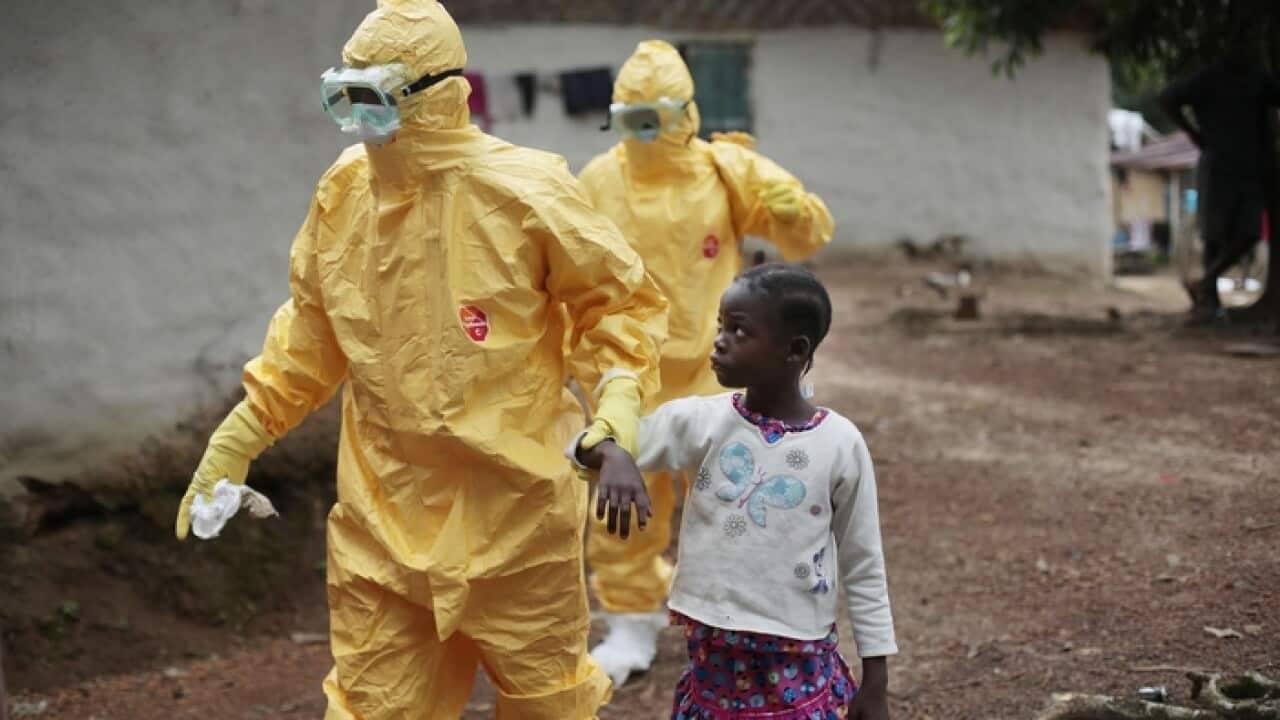(Transcript from World News Radio)
With the Ebola crisis passing its one-year anniversary in West Africa, more than 10,000 people are dead and twice as many have been infected.
Many successes have been established in the fight against the virus that started slowly, then gained momentum.
But health officials warn complacency and widespread traditional beliefs still continue to sap the energy out of the fight to eradicate it and are helping keep it going.
Ron Sutton has the story.
(Click on audio tab to listen to this item)
A year ago, it would have been unthinkable.
As grieving relatives watch powerlessly, men in something resembling spacesuits pull bodies from people's houses, denying relatives any chance to bury them.
More than 10,200 people have now died from the Ebola virus just in Guinea, Sierra Leone and Liberia a year after the first case was declared in Guinea.
Liberia has managed to almost contain the outbreak there, but Guinea and Sierra Leone are still very much fighting a losing battle.
Why?
The executive director of the Health For All Coalition, Charles Mambu, points to a disturbing trend.
"We have society men and women who are very powerful within their communities, and they have adopted long before this time the fates of that religious person. In fact, when he or she dies, that is the time the blessing is actually bestowed upon him or her and that everybody will want to get that blessing by touching the dead body of that religious person. In some of these communities, when these religious people die, they still wash their body, when the society people die, they still wash their body, and they still continue to bury those dead people secretly in the various communities. This is the actual fight we have now."
Medical staff and Ebola officials talk of a fourth wave of victims happening in Guinea right now.
Some analysts say, whenever a wave passes and the number of Ebola cases decreases, medical workers in those countries relax and mistakes follow.
But also, as Ebola has ravaged the region, some people have found it hard to accept the tough rules put in place to eradicate the epidemic.
That includes the safe burials and the forbidding of family members from kissing the bodies of the deceased.
In Guinea, health workers have often been attacked, and some medics have even died while trying to save others.
Some of that same conflict happened in Sierra Leone, and row upon row of graves, some unmarked, now fill Kingston Cemetery in Freetown.
The cemetery's caretaker, Abdul Rahman Parker, says he has witnessed firsthand the raw pain of thousands of people, especially around the burial practices.
"It was tense. It was tough anyway -- you know, coping with family members was a big issue in itself, since, when a Sierra Leonean died, to bury them, to put their body in a body bag, is very, very painful. And I feel very, very guilty during that burial process here at the Kingston Cemetery. But by the grace of God, we were able to manage the situation and put the situation under control."
In Guinea, the health ministry says the number of suspected hidden cases has more than doubled since February.
In Sierra Leone, president Ernest Bai Koroma says residents in that land's three remaining hotspots have been confined to their homes for three days to stop the spread.
Health officials have carried out house-to-house searches to then identify the sick.
"The campaign will provide an opportunity for communities to be directly involved in the drive to zero cases, to reflect and pray for the eradication of this disease from our country.""
Preventing unsafe burials remains a top priority, but religion and tradition continue to carry more regard than medical science in some areas.
The international medical organisation Medecins Sans Frontieres has published a scathing report saying only more effort to get communities to cooperate can work.
The organisation's head in Guinea, Jerome Mouton, cites that country foremost.
(French, then translated:) "The major obstacle that prevents us from going further and putting an end to this epidemic is really Guinea, the resistance of the population there as opposed to the people of Liberia and Sierra Leone, who appear to have fully comprehended the existence of this disease and the actions needed to fight it. In Guinea, we're always in a situation where there's denial of the illness or people hiding their patients and refusing to be identifed as contact, and it's this that prevents us from taking control and really going to the last case."
Share

